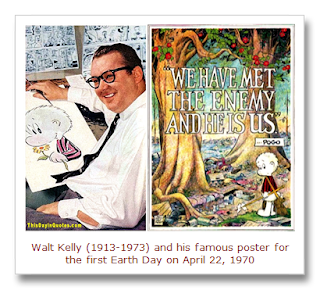Topics: Artificial Intelligence, Climate Change, Existentialism
Pogo is porcupine and philosopher, the cartoon above used in its inaugural on the first Earth Day. As such, he's usually about the environment and recently, climate change. From the link for the image above: "Pogo’s quip was a pun based on the famous quotation “We have met the enemy and they are ours” — one of two famous quotes made by American Navy Commodore Oliver Hazard Perry on September 10, 1813, after defeating a British naval squadron on Lake Erie during the War of 1812. (Perry’s other famous quote that day was “Don’t give up the ship.” )" In this case, it could be the tech version of a "Freudian slip."
This summer, Elon Musk spoke to the National Governors Association and told them that “AI is a fundamental risk to the existence of human civilization.” Doomsayers have been issuing similar warnings for some time, but never before have they commanded so much visibility. Musk isn’t necessarily worried about the rise of a malicious computer like Skynet from The Terminator. Speaking to Maureen Dowd for a Vanity Fair article published in April, Musk gave an example of an artificial intelligence that’s given the task of picking strawberries. It seems harmless enough, but as the AI redesigns itself to be more effective, it might decide that the best way to maximize its output would be to destroy civilization and convert the entire surface of the Earth into strawberry fields. Thus, in its pursuit of a seemingly innocuous goal, an AI could bring about the extinction of humanity purely as an unintended side effect.
This scenario sounds absurd to most people, yet there are a surprising number of technologists who think it illustrates a real danger. Why? Perhaps it’s because they’re already accustomed to entities that operate this way: Silicon Valley tech companies.
Consider: Who pursues their goals with monomaniacal focus, oblivious to the possibility of negative consequences? Who adopts a scorched-earth approach to increasing market share? This hypothetical strawberry-picking AI does what every tech startup wishes it could do — grows at an exponential rate and destroys its competitors until it’s achieved an absolute monopoly. The idea of superintelligence is such a poorly defined notion that one could envision it taking almost any form with equal justification: a benevolent genie that solves all the world’s problems, or a mathematician that spends all its time proving theorems so abstract that humans can’t even understand them. But when Silicon Valley tries to imagine superintelligence, what it comes up with is no-holds-barred capitalism.
The ethos of startup culture could serve as a blueprint for civilization-destroying AIs. “Move fast and break things” was once Facebook’s motto; they later changed it to “Move fast with stable infrastructure,” but they were talking about preserving what they had built, not what anyone else had. This attitude of treating the rest of the world as eggs to be broken for one’s own omelet could be the prime directive for an AI bringing about the apocalypse. When Uber wanted more drivers with new cars, its solution was to persuade people with bad credit to take out car loans and then deduct payments directly from their earnings. They positioned this as disrupting the auto loan industry, but everyone else recognized it as predatory lending. The whole idea that disruption is something positive instead of negative is a conceit of tech entrepreneurs. If a superintelligent AI were making a funding pitch to an angel investor, converting the surface of the Earth into strawberry fields would be nothing more than a long overdue disruption of global land use policy.
Silicon Valley Is Turning Into Its Own Worst Fear, Ted Chiang, Buzz Feed News

Comments